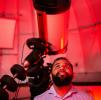Community Outreach
Queen’s is helping prepare the region for the coming total solar eclipse
March 14, 2024
Share

Dr. Nikhil Arora completed his Master’s and PhD at Queen’s, where he currently studies dark matter and how it affects galaxies.
How many astronomers does Kingston have? On April 8, 2024, it will have thousands – at least if you count the amateur scientists who will be observing a total solar eclipse that afternoon. Getting Kingstonians excited to be astronomers for a day is one of the main goals of an outreach program led by the Department of Physics, Engineering Physics & Astronomy, which is working with local school boards to promote the science of eclipses and how to watch them safely.
Over 80 schools from Limestone District School Board and Algonquin and Lakeshore Catholic District School Board have registered to host workshops that are teaching students about eclipses and why they happen, and how eclipses have helped researchers advance the understanding of light.
The outreach work is performed by a group of 70 campus community volunteers recruited by the Department of Physics, Engineering Physics, and Astronomy, which includes faculty, undergraduate and graduate students, post-doctoral fellows, and staff. The team is led by astronomy post-doctoral fellow and Queen’s eclipse coordinator Nikhil Arora.
“Our eclipse ambassadors are sharing scientific knowledge and, importantly, are showing these young people that science can be for everyone.”
– Dr. Arora
Queen’s Eclipse Outreach Coordinator Department of Physics, Engineering Physics & Astronomy

He and his team have created special resources to offer in workshops that speak to different age ranges: while one group can focus on how big the universe is and how different planets in the Solar System experience eclipses, others can focus on how scientists use light coming from across the universe to better understand the cosmos.
“For example, we tell them the story of how helium was discovered during a total solar eclipse in 1868,” says Dr. Arora. At that time, French astrophysicist Jules Janssen used a prism to decompose the light coming from the Sun and noticed an unexpected yellow light, later found to be created by helium.
Beyond facts and figures about physics and astronomy, every workshop also includes a hands-on component, such as playing with scale models of the Sun, the Moon, and the Earth, or creating pinhole cameras. Learning about eclipse safety is also paramount.
All the volunteers have received outreach training and support materials on the science of eclipses. In groups of three to six, they enter the schools determined to get students passionate about science, with a focus on providing schools with positive, fun interactions. The approach has been successful so far, and Dr. Arora proudly recalls that a student even said he was “the funniest physicist on Earth.” Queen’s eclipse ambassadors also get a lot of curious questions about black holes, aliens, and the universe in general.
“Anyone can find information about eclipses online, but what we are really offering to these students is an opportunity to meet with scientists and just see how approachable physics can be,” says Dr. Arora.
Dr. Robert Knobel and Dr. Nikhil Arora (Department of Physics, Engineering Physics & Astronomy).
“To observe many astronomical events, like a distant planet passing by, you might need expensive equipment, or you might need to get out of the city and close to a dark sky region to see things like a meteor shower,” says Dr. Arora. “Not for the total solar eclipse. You just need to wear proper eye protection and step out of your house or workplace and look at the sky. It’s very inclusive.”
In the past 2,024 years, Kingston has only seen nine total solar eclipses. After the upcoming event on April 8, the city will not witness another until 2399. Dr. Arora and the team want to make sure young Kingstonians won’t miss this once-in-a-lifetime opportunity.
This story is part of a series that will uncover the science behind the total solar eclipse that will be observed from Kingston on April 8, 2024. For more information and resources on the total solar eclipse, visit the Queen’s eclipse website.
Did you know that starting March 25 Queen’s is distributing certified eclipse glasses to the campus and Kingston community? Learn more about our distribution sites.